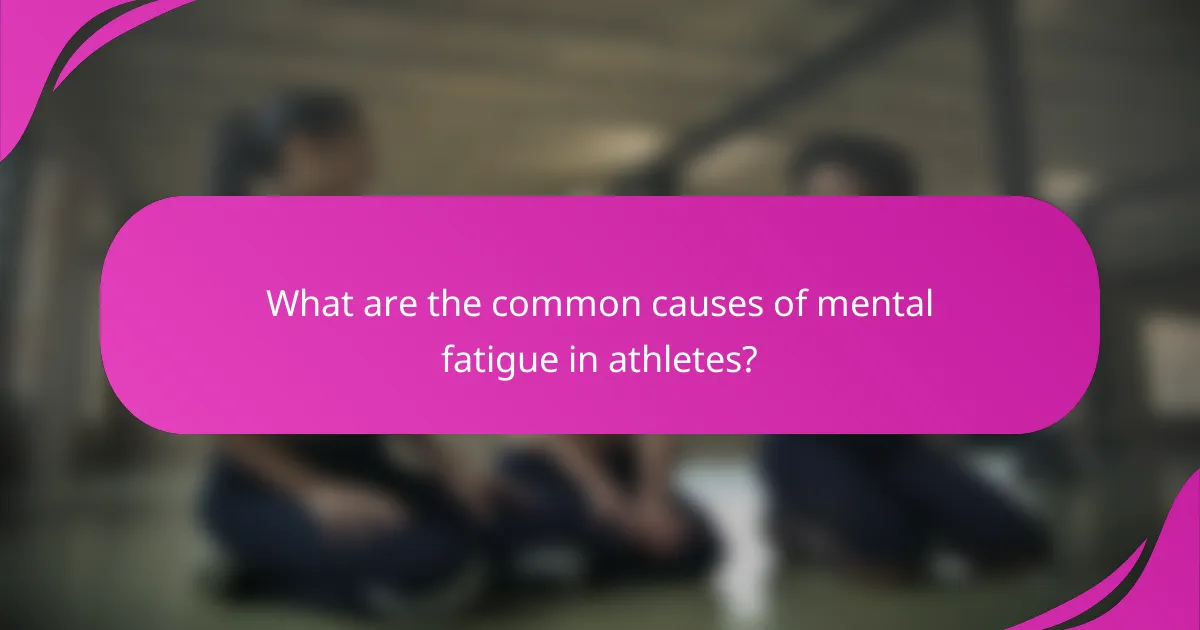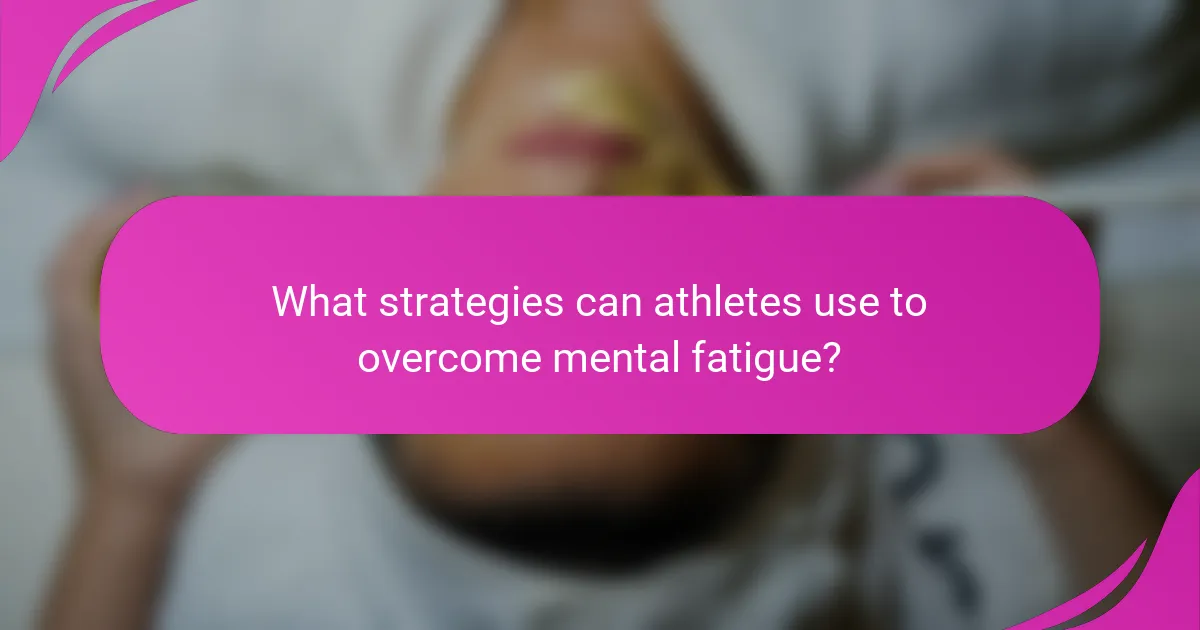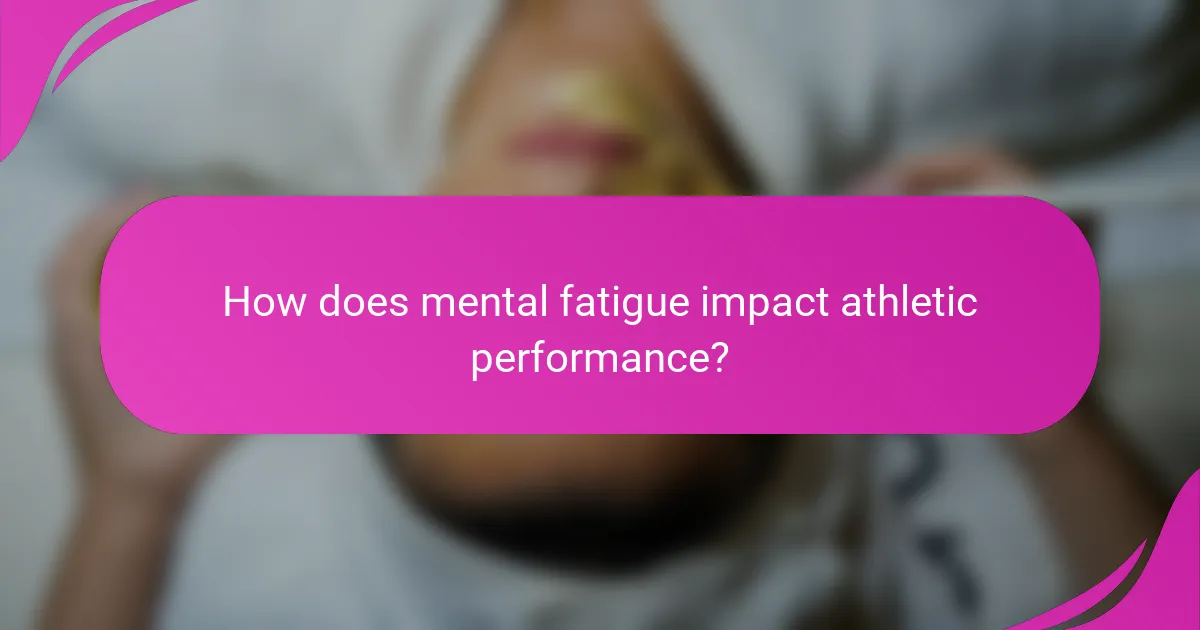Mental fatigue can hinder athletic performance by affecting focus, motivation, and decision-making. This article explores common causes of mental fatigue, effective recovery strategies, and unique methods like cryotherapy and mindfulness practices. Prioritizing rest, hydration, and balanced nutrition is essential for enhancing recovery and maintaining peak performance. Understanding these factors can help athletes regain mental clarity and resilience.

What is Mental Fatigue and How Does it Affect Athletes?
Mental fatigue significantly impacts athletes by reducing their cognitive function, motivation, and overall performance. It can lead to decreased focus, slower reaction times, and poor decision-making. Athletes experiencing mental fatigue may struggle with maintaining training intensity and consistency. Recovery strategies, such as adequate rest, mental breaks, and mindfulness practices, are essential for overcoming mental fatigue and enhancing athletic performance. Prioritizing mental health is crucial for sustained athletic success.
What are the symptoms of mental fatigue in sports?
Mental fatigue in sports manifests through symptoms like decreased motivation, lack of focus, irritability, and physical exhaustion. Athletes may also experience difficulty in decision-making and diminished performance levels. Recognizing these symptoms early can aid in effective recovery strategies to enhance athletic performance.
How does mental fatigue differ from physical fatigue?
Mental fatigue primarily affects cognitive functions, while physical fatigue impacts bodily strength and endurance. Mental fatigue can result from prolonged mental effort, leading to decreased motivation and concentration. In contrast, physical fatigue arises from physical exertion, resulting in muscle tiredness and reduced physical performance. Understanding these differences is crucial for athletes seeking to enhance recovery strategies and improve overall performance.

What are the common causes of mental fatigue in athletes?
Common causes of mental fatigue in athletes include prolonged training, lack of recovery, high stress levels, inadequate nutrition, and poor sleep quality. Each factor contributes to decreased focus and motivation, impacting performance. Addressing these issues is crucial for effective recovery and mental resilience.
How do training intensity and volume contribute to mental fatigue?
Training intensity and volume significantly impact mental fatigue by overwhelming cognitive resources. High-intensity workouts can lead to increased stress hormones, resulting in mental exhaustion. Volume, or the total training load, contributes to fatigue when excessive, impairing recovery and focus. Balancing intensity and volume is crucial for optimal mental resilience and performance.
What role does competition pressure play in mental fatigue?
Competition pressure significantly contributes to mental fatigue by increasing stress levels and emotional demands. Athletes often face heightened expectations, which can lead to anxiety and burnout. This pressure can impair focus and decision-making, ultimately hindering performance. Effective strategies to manage this pressure include mindfulness techniques and structured recovery plans, which can help athletes regain mental clarity and enhance overall recovery.

What strategies can athletes use to overcome mental fatigue?
Athletes can overcome mental fatigue by implementing strategies like setting realistic goals, practicing mindfulness, and ensuring adequate rest. These approaches enhance focus and recovery.
Setting realistic goals helps athletes break down tasks into manageable steps, reducing overwhelm. Mindfulness techniques, such as meditation, improve mental clarity and resilience. Prioritizing rest, including sleep and recovery days, allows the mind to recharge and enhances overall performance.
How can rest and recovery techniques enhance mental clarity?
Rest and recovery techniques significantly enhance mental clarity by reducing fatigue and improving focus. Techniques such as mindfulness, adequate sleep, and active recovery promote cognitive function. For instance, studies show that sleep deprivation can impair attention and decision-making, while proper rest restores these abilities. Incorporating structured recovery strategies leads to enhanced mental performance, allowing athletes to perform optimally.
What are effective sleep strategies for athletes?
To enhance athletic recovery, effective sleep strategies include prioritizing sleep hygiene, establishing a consistent sleep schedule, and utilizing relaxation techniques. Athletes should aim for 7-9 hours of quality sleep per night, which significantly impacts performance and recovery. Implementing a wind-down routine, such as limiting screen time and practicing deep breathing, can further improve sleep quality.
How does nutrition impact mental recovery?
Nutrition significantly influences mental recovery by providing essential nutrients that support brain function and mood regulation. Consuming a balanced diet rich in omega-3 fatty acids, antioxidants, and vitamins can enhance cognitive performance and reduce fatigue. For example, studies show that omega-3s can improve mood and cognitive flexibility, which are vital for athletes recovering from mental fatigue. Additionally, hydration plays a crucial role; even mild dehydration can impair cognitive function. Prioritizing nutrient-dense foods promotes overall mental well-being, facilitating a quicker recovery process.
What mental training techniques can athletes adopt?
Athletes can adopt mental training techniques such as visualization, mindfulness, and goal setting to combat mental fatigue. Visualization enhances focus and performance by mentally rehearsing success. Mindfulness practices reduce stress and improve concentration. Goal setting establishes clear objectives, fostering motivation and resilience. These techniques collectively enhance athletic recovery and mental well-being.
How can mindfulness practices reduce mental fatigue?
Mindfulness practices can significantly reduce mental fatigue by promoting relaxation and enhancing focus. Techniques such as meditation and deep breathing help lower stress levels, which directly impacts cognitive function. Research shows that regular mindfulness practice can improve attention span and mental clarity, making it easier to recover from fatigue. Additionally, mindfulness fosters a greater sense of self-awareness, allowing individuals to recognize and manage their mental state more effectively. This unique attribute of mindfulness contributes to improved athletic recovery by enabling athletes to maintain mental resilience during training and competition.
What role does visualization play in recovery?
Visualization plays a crucial role in recovery by enhancing mental focus and promoting relaxation. It helps athletes mentally rehearse their performance, reducing anxiety and improving confidence. Studies show that visualization can accelerate physical recovery by activating similar neural pathways used during actual performance. This technique fosters a positive mindset, essential for overcoming mental fatigue and enhancing overall athletic recovery.

How does mental fatigue impact athletic performance?
Mental fatigue significantly impairs athletic performance by reducing concentration, coordination, and motivation. Athletes experiencing mental fatigue may struggle with decision-making and reaction times, leading to decreased overall effectiveness. Research shows that mental fatigue can lower performance levels by up to 20%, highlighting its critical impact on competitive outcomes. Implementing recovery strategies, such as mindfulness and proper rest, can enhance cognitive function and restore athletic capabilities.
What are the short-term effects of mental fatigue on competition?
Mental fatigue can significantly impair competition performance in the short term. Athletes may experience decreased focus, slower reaction times, and diminished decision-making abilities. These effects can lead to increased errors and reduced overall effectiveness in their sport. Research indicates that mental fatigue can also lower motivation levels, impacting training and competitive outcomes.
How can long-term mental fatigue lead to burnout?
Long-term mental fatigue can lead to burnout by depleting emotional and physical resources. Prolonged stress without recovery hampers cognitive function and motivation, resulting in decreased performance and increased irritability. This state can escalate to chronic exhaustion, affecting overall well-being and athletic recovery. Recognizing early signs of mental fatigue is crucial for implementing effective recovery strategies.

What unique recovery methods are available for athletes?
Athletes can utilize unique recovery methods such as cryotherapy, floatation therapy, and mindfulness practices. Cryotherapy involves exposure to extreme cold to reduce inflammation and muscle soreness. Floatation therapy allows athletes to relax in a sensory deprivation tank, promoting mental recovery and stress relief. Mindfulness practices, including meditation and yoga, enhance mental clarity and focus, aiding overall recovery. These methods collectively address both physical and mental fatigue, essential for optimal athletic performance.
How does sports psychology support mental recovery?
Sports psychology significantly aids mental recovery by enhancing focus, resilience, and emotional regulation. Techniques such as visualization and cognitive restructuring help athletes manage stress and improve performance. Research indicates that athletes who engage in psychological training report lower levels of anxiety and higher self-confidence, facilitating a more effective recovery process. Additionally, mental skills training can foster a positive mindset, which is crucial for overcoming mental fatigue and achieving peak performance.
What are the benefits of working with a mental coach?
Working with a mental coach enhances focus, resilience, and self-awareness in athletes. They provide personalized strategies to manage mental fatigue and improve overall performance. Coaches facilitate goal-setting and accountability, fostering a structured recovery process. As a result, athletes experience improved mental clarity and emotional balance, which are crucial for peak performance.

What rare factors contribute to mental fatigue in specific sports?
Certain rare factors contribute to mental fatigue in specific sports, including environmental stressors, unique competitive pressures, and individual psychological traits. Environmental factors like extreme weather can drain mental energy. Unique pressures in high-stakes situations may lead to heightened anxiety. Individual traits, such as perfectionism, can exacerbate fatigue by creating unrealistic expectations. Understanding these factors can help athletes develop tailored strategies for recovery and performance enhancement.
How do team dynamics influence mental fatigue in team sports?
Team dynamics significantly impact mental fatigue in team sports by influencing motivation and communication. Positive interactions foster resilience, while negative relationships can exacerbate stress. Research shows that cohesive teams experience lower mental fatigue due to enhanced support systems. In contrast, conflicts within a team can lead to increased cognitive load, hindering performance. Addressing these dynamics is crucial for effective recovery strategies.
What unique challenges do endurance athletes face regarding mental fatigue?
Endurance athletes face unique challenges with mental fatigue, including prolonged concentration demands and emotional stress. These factors can lead to decreased performance and motivation. Mental fatigue affects decision-making and reaction times, increasing the risk of injury. Strategies to combat this include mindfulness practices, structured recovery periods, and mental conditioning exercises.

What are the best practices for preventing mental fatigue?
To prevent mental fatigue, prioritize adequate rest, hydration, and balanced nutrition. Incorporate regular breaks during training to maintain focus and energy. Mindfulness practices can enhance mental clarity and reduce stress. Establish a consistent sleep schedule to support recovery. Engage in light physical activity to stimulate both body and mind.
How can athletes create a balanced training schedule?
Athletes can create a balanced training schedule by incorporating recovery periods, varying workout intensities, and setting clear goals. Prioritize rest days to prevent mental fatigue and enhance overall performance. Integrate cross-training to target different muscle groups, which supports recovery and reduces the risk of injury. Regularly assess progress and adjust the schedule based on physical and mental well-being.
What are the common mistakes athletes make in managing mental fatigue?
Athletes often overlook key strategies in managing mental fatigue, leading to decreased performance. Common mistakes include neglecting rest periods, failing to recognize signs of burnout, and ignoring the importance of mental health training. Many athletes also underestimate the benefits of mindfulness practices, which can enhance focus and recovery. Additionally, they might prioritize physical training over psychological resilience, hindering their overall performance.
How can athletes implement a holistic recovery plan?
Athletes can implement a holistic recovery plan by integrating physical, mental, and emotional strategies. Focus on balanced nutrition, adequate sleep, and active recovery techniques. Incorporate mindfulness practices and mental conditioning to combat fatigue. Regular assessments of recovery progress enhance effectiveness.
What role does cross-training play in mental recovery?
Cross-training significantly aids mental recovery by providing variety and reducing monotony in training routines. Engaging in different physical activities can enhance mood and decrease stress levels, contributing to overall mental well-being. This approach allows athletes to recover from fatigue while maintaining physical fitness, promoting a balanced mental state. Studies suggest that incorporating diverse exercises can lead to improved cognitive function and resilience, making cross-training a unique attribute in mental recovery strategies.
How can athletes integrate rest days effectively?
Athletes can effectively integrate rest days by scheduling them strategically within their training cycles. Prioritize rest days after intense training sessions to allow for optimal recovery. Incorporate light activities on rest days, such as stretching or yoga, to maintain mobility without overexertion. Regularly assess mental fatigue and adjust rest days accordingly, ensuring they align with overall training goals. Consistent rest enhances performance, reduces injury risk, and contributes to long-term athletic success.

What expert insights can help athletes enhance their mental recovery?
Athletes can enhance their mental recovery by adopting mindfulness techniques, engaging in cognitive behavioral strategies, and prioritizing rest. Mindfulness practices, like meditation, improve focus and reduce anxiety. Cognitive behavioral strategies help athletes reframe negative thoughts, fostering resilience. Adequate rest, including quality sleep, is crucial for mental rejuvenation.
What are the latest trends in mental recovery for athletes?
Recent trends in mental recovery for athletes focus on holistic approaches, emphasizing mindfulness, cognitive behavioral techniques, and personalized recovery plans. These methods enhance mental resilience and reduce fatigue, leading to improved overall performance. Athletes increasingly utilize technology, such as apps for meditation and mental health tracking, to facilitate their recovery process. Additionally, collaborative support systems involving coaches and sports psychologists are gaining traction, fostering a comprehensive environment for mental wellness.
How can technology assist in monitoring mental fatigue levels?
Technology assists in monitoring mental fatigue levels through wearable devices and mobile applications. These tools track physiological metrics such as heart rate variability, sleep patterns, and activity levels. Advanced algorithms analyze this data to provide insights into mental fatigue, helping athletes optimize recovery. For example, biofeedback devices can indicate when mental fatigue peaks, allowing for timely interventions. By leveraging real-time data, athletes can make informed decisions about training intensity and rest periods, enhancing overall performance.